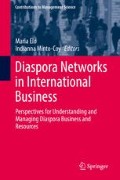Abstract
The number of international migrants has continued to grow rapidly reaching 244 million in 2015 (United Nations, Department of Economic and Social Affairs, Population Division. Trends in international migrant stock: the 2015 revision, 2015). The rise in the number of international migrants reflects the increasing importance of international migration, which has become an integral part of our economies and societies. With appropriate policies and effective strategies, migration can contribute to inclusive and sustainable economic growth and development in both home and host communities. Continuously emerging as among the top countries of the world with the largest and fastest growing population of international migrants, the Philippines, based on recent stock estimates, has a total 10.2 million overseas Filipinos dispersed in different parts of the globe. Arguably, within the developing world, there is no other country more strategically positioned than the Philippines to reap the development benefits of international migration. Nearly tenth of the country’s population works or lives abroad and possesses various skills and resources which are potential driving force for the country’s development.
This chapter presents the Philippines experiences, challenges and lessons learned in managing diaspora resources. In particular, this chapter discusses a number of policies and initiatives that the Philippines has developed and undertaken at all levels and among various stakeholders with the view of harnessing the development potential of migration and to promote and facilitate overseas Filipinos engagement.
Access this chapter
Tax calculation will be finalised at checkout
Purchases are for personal use only
Notes
- 1.
Etymology of “diaspora”—“dia” meaning “through or over” and “speiro” meaning “dispersal or to sow”—suggests the idea of the movement of people from their homeland to other parts of the world.
- 2.
To know more about the Commission on Filipinos Overseas, http://www.cfo.gov.ph/about-us.html
- 3.
To know more about LINKAPIL visit: http://www.cfo-linkapil.org.ph
- 4.
To know more about the OFs-RED Project visit: http://ofredtipudno.com
- 5.
To know more about Peso Sense visit: <http://www.pesosense.com/> and <https://www.facebook.com/pesosenseph>
- 6.
To know more about the Global Summit visit: http://www.cfo.gov.ph/other-programs-initiatives/global-summit-of-filipinos-in-the-diaspora.html
- 7.
To know more about ENFiD visit: http://enfid.org/
- 8.
To know more about BaLinkBayan visit: http://balinkbayan.gov.ph/
- 9.
To know more about the Presidential Awards visit: http://presidentialawards.cfo.gov.ph
- 10.
To know more about the Month of Overseas Filipinos celebration visit: http://mof.cfo.gov.ph
References
Agunias D, Newland K (2012) Developing a road map for engaging diasporas in development: a handbook for policymakers and practitioners in home and host countries. International Organization for Migration and Migration Policy Institute
Aikins K, White N (2011) Global diaspora strategies toolkit. Diaspora Matters
Bangko Sentral ng Pilipinas (2016) Consumer expectation report 2016. http://www.bsp.gov.ph/publications/regular_consumer.asp
Battistella G, Asis M (2013) Country migration report: the Philippines 2013. Scalabrini Migration Center and International Organization for Migration
Brinkerhoff JM (2009) Digital diasporas: identity and transnational engagement. Cambridge University Press, Cambridge
Brinkerhoff JM (2016) Institutional reform and diaspora entrepreneurs: the in-between advantage. Oxford University Press, Oxford
Commission on Filipinos Overseas (2013) Stock estimates of overseas Filipinos. http://cfo.gov.ph/downloads/statistics/stock-estimates.html
Dennie K (2016) Nation branding: concepts, issues, practice. London: Routledge.
Elo M, Riddle L (2016) Diaspora business. Inter-disciplinary Press, Oxford
Gillespie K, Riddle L, Sayre E, Sturges D (1999) Diaspora interest in homeland investment. J Int Bus Stud 30(3):623–634
International Organization for Migration (2011) International migration law: glossary on migration, 2nd edn
Minto-Coy ID, Seraphin H (2017) The role of the diaspora in the emergence of economic & territorial intelligence in Haiti. Int J Bus Emerg Markets 9(1):48–67
Minto-Coy ID (2016a) In: Elo M, Riddle L (eds) The role of diasporas in the growth and internationalisation of businesses in countries of origin, diaspora business. Inter-Disciplinary.Net, Oxford
Minto-Coy ID (2016b) In: Crush J, Walton-Roberts M, Chikanda A (eds) Diaspora engagement for development in the Caribbean, diasporas, development and governance in the global south. Springer, New York
Minto-Coy ID (2009) Diasporas and development – The case of Ireland and the Caribbean (Caribbean Paper #7). Centre for International Governance Innovation, Waterloo, Canada
Minto-Coy ID (2013, unpublished) The Draft Jamaica Diaspora Policy, Paper prepared for the Government of Jamaica to guide the production of the National Diaspora Policy
National Economic and Development Authority (2011) Philippine development plan 2011–2016. http://devplan.neda.gov.ph/about-the-plan.php
Organization for Economic Cooperation and Development (2015) International migration outlook
Riddle L (2008) Diasporas: exploring their development potential. ESR Rev 10(2):28
United Nations, Department of Economic and Social Affairs, Population Division (2015) Trends in international migrant stock: the 2015 revision
World Bank Group (2016). Migration and remittances Factbook 2016, 3rd edn
Author information
Authors and Affiliations
Editor information
Editors and Affiliations
Rights and permissions
Copyright information
© 2019 Springer International Publishing AG, part of Springer Nature
About this chapter
Cite this chapter
Nicolas, I.M., Rodriguez, J.L.S. (2019). The Philippines Experience in Managing Diaspora Resources: Policies and Initiatives in Facilitating Diaspora Engagement. In: Elo, M., Minto-Coy, I. (eds) Diaspora Networks in International Business. Contributions to Management Science. Springer, Cham. https://doi.org/10.1007/978-3-319-91095-6_26
Download citation
DOI: https://doi.org/10.1007/978-3-319-91095-6_26
Published:
Publisher Name: Springer, Cham
Print ISBN: 978-3-319-91094-9
Online ISBN: 978-3-319-91095-6
eBook Packages: Business and ManagementBusiness and Management (R0)

